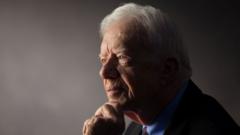In an era where mathematics intertwines with daily life, Alessio Figalli, a celebrated mathematician linked to ETH Zurich and the Institute for Advanced Study in Princeton, focuses his research on optimal transport. This area of study—rooted in seeking the most effective paths for resource allocation—has applications that span clouds, bubbles, and even chatbots.
Dr. Figalli, recipient of the prestigious Fields Medal in 2018, embraces mathematics that emerges from tangible natural problems. He appreciates its enduring nature, stating in a recent interview, “Math will be here forever,” highlighting the definitive nature of mathematical theorems.
The optimal transport concept dates back close to two and a half centuries, established by Gaspard Monge, a French mathematician. Monge's exploration was initially driven by military engineering needs during the Napoleonic Era, focusing on minimizing material transportation costs for building fortifications.
In 1975, Leonid Kantorovich, a Russian mathematician, further advanced this field, earning a Nobel Prize in economic science. He introduced rigorous frameworks for resource allocation optimization, often using relatable scenarios like bakeries and coffee shops striving to distribute croissants efficiently.
Dr. Figalli explains this as a "global wellness optimization problem," emphasizing the interconnectedness of entities—a bakery’s decisions affect coffee shops and vice versa. This creates significant complexity as optimizing for the overall benefit of the population is far more challenging than optimizing for a single player’s utility.
The conversation with Dr. Figalli reflects on his journey in mathematics, the significance of optimal transport, and the broader implications of his work on society, underscoring the infinite reach mathematics has in addressing complex global challenges.
Dr. Figalli, recipient of the prestigious Fields Medal in 2018, embraces mathematics that emerges from tangible natural problems. He appreciates its enduring nature, stating in a recent interview, “Math will be here forever,” highlighting the definitive nature of mathematical theorems.
The optimal transport concept dates back close to two and a half centuries, established by Gaspard Monge, a French mathematician. Monge's exploration was initially driven by military engineering needs during the Napoleonic Era, focusing on minimizing material transportation costs for building fortifications.
In 1975, Leonid Kantorovich, a Russian mathematician, further advanced this field, earning a Nobel Prize in economic science. He introduced rigorous frameworks for resource allocation optimization, often using relatable scenarios like bakeries and coffee shops striving to distribute croissants efficiently.
Dr. Figalli explains this as a "global wellness optimization problem," emphasizing the interconnectedness of entities—a bakery’s decisions affect coffee shops and vice versa. This creates significant complexity as optimizing for the overall benefit of the population is far more challenging than optimizing for a single player’s utility.
The conversation with Dr. Figalli reflects on his journey in mathematics, the significance of optimal transport, and the broader implications of his work on society, underscoring the infinite reach mathematics has in addressing complex global challenges.






















